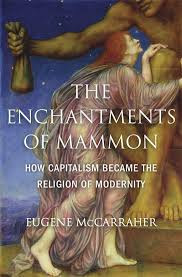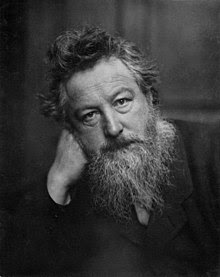Keeping to the promise I made in my March blogpost about Eugene McCarraher and his 2019 masterpiece, The Enchantments of Mammon, here is a summary of the Professor's main points in the first of the seven parts of his monumental work. Part One (pp.19-106) is called: The Dearest Freshness Deep Down Things: Capitalist Enchantment in Europe, 1600-1914.
 |
| McCarraher's 2019 masterpiece |
- The age of capitalist enchantment began in England in the 16th and 17th centuries. A capitalist vanguard of landowners and merchants blazed a trail of 'improvement' that swept away the ties of common-land holding that had been blessed by the medieval church. Puritan improvers had a Protestant ethic that was perfectly compatible with omens and portents and matters of the Spirit. The metaphysical enchantments of medieval Catholicism were reworked into the imperatives of Protestant dispossession and enclosure of land for profit - in the name of God.
- English Protestants such as Richard Baxter and John Locke developed a systematic theology of the divine right of capitalist property which still embraced the power of the sacred enchantments - although other Protestants such as Gerard Winstanley and the Diggers offered a radical communistic alternative which was duly swept away. For Winstanley, God 'is in all things, and by him all things consist'. God had ordained common ownership of the planet as the original state of nature. That was a message that was anathema to the emerging capitalist age.
- Capitalism emerged as the moral and political economy of modern enchantment. Protestantism was a reformation of enchantment. In early Europe, and especially in England, educated Protestants became a new clerisy of enchantment. Sir Francis Bacon, a seminal figure in the development of scientific methodology, was also steeped in alchemical and occult lore; so too were Robert Boyle and Isaac Newton.
- Puritans were adamant that they could not serve two masters: God and Mammon. The NT biblical injunction remained paramount. Yet, somehow the same God who created all had also made the market for pecuniary glory. Profit-making followed the grain of the universe; it was God's will. The pursuit of wealth now became mandatory - with, of course, due respect for the souls of others whatever that might mean. What may seem Puritan avarice had been moulded so it had sacramental approval.
- Even John Locke thought of God as the Almighty Sponsor of Improvement. Locke measures terms such as 'advantage', 'convenience', and 'improvement' in almost wholly pecuniary terms. 'Improvement' meant not just the art of cultivation through, say, enclosure but also the science of profitable enterprise. What mattered to Locke was the exchange value that was now created in land and assessed in monetary terms. The metaphysics of capital had replaced notions of communal stewardship of land as a sacred substance. Locke explicitly provided the justification for dispossessing native Americans of their land due to their lack of prowess in doing 'His business', that is 'improving' the land.
 |
| John Locke (1632-1704) - a portrait of Locke painted by Godfrey Kneller in 1697 |
- By the early 19th century, Evangelical Christians had begun to replace the Puritan voice of capitalist enchantment with a message that proclaimed that there was now a science of wealth whose laws had been decreed by God. The Good Lord had created property, markets, and enterprise. He had built in the scarcity and struggle for ordinary people as His paternal inducement to labour, innovation, and riches. The gospel of capitalist freedom was preached loud and clear. It still is, not least in the USA. Yet, many evangelicals were attracted still to enchanted powers such as mesmerism and the occult. Thomas Malthus is an egregious example of an Anglican pastor and evangelical economist who argued that evil was a necessary good and privation of the poor was a necessary compulsion for moral and material improvement. The God of Love had now become the God who has consigned the poor and dispossessed to a lifelong Calvary road.
.jpg) |
| Thomas Malthus (1766 -1834) - a portrait in the year of his death,1834 |
- As the industrial revolution triggered by the urge for 'improvement' advanced through the 19th century, opposition arose from those who smelt a rat in this prevailing gospel of capitalist enchantment. Marx from an atheist and materialist position offered his alternative; Carlyle, Ruskin, and Morris offered theirs from a Romantic sacramental imagination. It was John Ruskin who "unconverted" from his parent's evangelical faith and later sneered in The Crown of Wild Olive (1866): "You knock a man into a ditch, and then you tell him to remain content in 'the position in which Providence has placed him'. That's modern Christianity." For Marx, "the power of money in bourgeois society" animated a pecuniary way of being in the world. Objects which we need for use become "worth" so much in money and their value then becomes an exchange-value. Marx explored the spell of so-called 'fetishism' by which people attribute a kind of agency and independence to commodities, the products of their own labour. Thus commodity fetishism becomes a capitalist form of alienation, a modern recipe for the opium of the people - in short, the sacramental system of capitalism.
- The Romantic critique of the mercenary and instrumentalist values of industrial capitalism sought to revive in some more modern form the values cherished from pre-modern societies. Marx was highly critical of such 'nostalgia', declaring that modern revolution "could not draw its poetry from the past; it can only draw it from the future". For all their eloquent invective against industrial capitalism, Carlyle and Ruskin nevertheless championed monarchy and feudalism, opposed Chartism, and regarded British imperialism as a necessary form of moral instruction. (Carlyle's definition of economics as "the dismal science" came in the midst of a defense of Jamaican slavery.) Yet their emphasis on 'the moral unity of the world' and the need for common purpose to bind humanity together has left an indelible impact on writers since. Carlyle condemned capitalism as a violation of "Wonder". The "Gospel of Mammonism" was a fraudulent religion. However, Carlyle could never grasp the possibility that all the Lord's people could be prophets and heroes; he remained opposed to democracy and a defender of slavery.
- Ruskin too was a monarchist - and an imperial racist who proposed paternalist compassion as an antidote to working-class political struggle. Yet Ruskin's voice remained a powerful weapon against capitalism - he even denied that economics is a science, comparing it to "alchemy, astrology, witchcraft, and other such popular creeds". Economics is untrue because its account of human nature is fallacious - we are impelled by a Soul, not calculating self-interest. Ruskin's vision is sacramental.
- Morris too inflected his socialist writing with a compelling sacramental hope, despite his professed aloofness from religious and theological matters. He was making a religion of socialism and beauty - and his longing for a heavenly fellowship was shared by many in the Arts and Crafts movement. Perhaps predictably, Romantic opposition to capitalist squalor became transmuted into bourgeois bohemianism.
.webp) |
Karl Marx (1818-1883) - a photograph by John Mayall in 1875
|
.jpg) |
Thomas Carlyle (1795-1881) - photograph by Elliott & Fry c.1865
|
 |
| John Ruskin (1819-1900) - photo image in 1863 |
 |
| William Morris (1834-1896) - photographed by Frederick Hollyer in 1887 |


.jpg)
.webp)
.jpg)


No comments:
Post a Comment